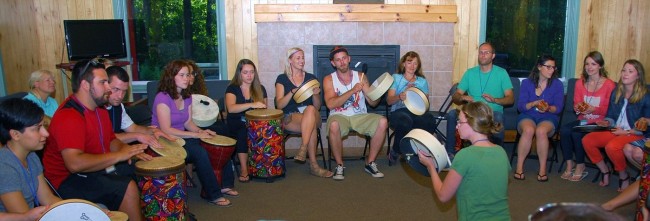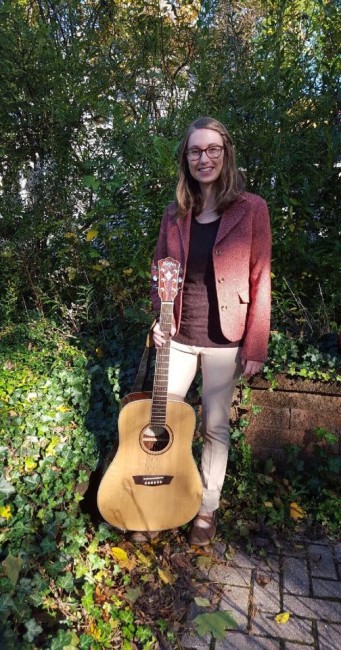 Recently, we had the pleasure of chatting with Blair graduate Miriam Sherk, and listening with amazement to her day-to-day schedule and accomplishments as a music therapist. It was fascinating to hear how much of a role music plays in her work, in her ability to do her work, and, most importantly, in her ability to connect with patients who a therapist might not otherwise be able to reach.
Recently, we had the pleasure of chatting with Blair graduate Miriam Sherk, and listening with amazement to her day-to-day schedule and accomplishments as a music therapist. It was fascinating to hear how much of a role music plays in her work, in her ability to do her work, and, most importantly, in her ability to connect with patients who a therapist might not otherwise be able to reach.
Miriam’s story reminds us of the power music has to make a difference in people’s lives. We can use it to work through challenges and to connect to each other — concepts and skills Miriam says were instilled during her time as a Blair student.
What made you choose Blair for your undergraduate education?
I was definitely drawn to Blair because it was a part of Vanderbilt, which I knew would result in a very strong liberal arts education and degree. I have a lot of interests in addition to music, so that was important.
When I auditioned at Blair, I loved how it was small. I liked the bassoon studio and instructor, and the overall culture of Blair. I thought the bassoon instructor (at the time), Professor (Cynthia) Estill, would be a perfect match for me, and I clicked with her. Ultimately I chose Blair because of my relationship with her.
You’re doing something as your career that was not your major here at Blair. In fact, music therapy is not a major that we offer. How did you use the resources at Vanderbilt and Blair to create your path to a music therapy career?
Well, I think it was definitely encouraged when I wanted to add a double major (in psychology). That was a great thing. I could work with my adviser to make that happen, which ultimately was really important for building a foundation for grad school in music therapy. Because Vanderbilt has connections with the hospital, I was able to set up volunteer and shadowing (opportunities) with the music therapist at the Vanderbilt children’s hospital.
So if you could do it again, would you still choose Blair to pursue the same career path?
I would, definitely. That’s actually often a question that I’m asked, because most people who go into music therapy have a music therapy undergraduate program, and for me it was a little different. I had some extra coursework post-grad that Blair did not offer, but in hindsight, I absolutely loved my time at Vanderbilt and Blair — the experience and people there. I met my husband there!
At Blair, I could take classes that I wanted to take, even with a double major, and I could experience areas that interested me. It made for a more well-rounded education to prepare me for my career now. I didn’t just come out with this one skill set — I have more to offer.
How did your studies and any experiences at Blair help prepare you for what you’re doing now and shape you as a music therapist?
In my day-to-day work I’m always part of a clinical team, and I’m expected to be able to communicate pretty constantly and clearly in a professional and educated way. There’s a constant conversation. Particularly because I’m a music therapist, I’m speaking to people in a language that’s a little different. Some people don’t necessarily understand music therapy, so it’s important for me to speak up and clearly explain things. The small class settings at Blair, versus big lectures, gave me the opportunity to practice this.
In my work, I’m constantly in small groups of people, sharing what I’m doing clinically. I work in a setting that is often uncomfortable, and Blair classes prepared me to confidently share what I’m learning, perform, and be comfortable working in a team, which is definitely a big aspect of my job.
This was no longer about the performance or getting the notes right. This is about connecting with people through music. That was something that I knew how to do.
Speaking of your career, what is a typical day like for you?
I have worked in a variety of different settings of music therapy, which is one of the cool things about it! Currently, I work in home care hospice. Once a week I meet with our team, made up of nurses, social workers and a chaplain.
I start my day by looking through admission e-mails and finding patients who would benefit from music therapy. I have about 20 patients at a time, and I schedule my visits depending on their needs. Things change really quickly in hospice, so I am sure to contact patient families to check in about when I should come.
 I make visits in the morning and afternoon in homes and assisted-living facilities. The patients I see have been given a diagnosis of six months or less (to live). I have plans of care that are established at my first visit, but those also change depending on what’s going on with them.
I make visits in the morning and afternoon in homes and assisted-living facilities. The patients I see have been given a diagnosis of six months or less (to live). I have plans of care that are established at my first visit, but those also change depending on what’s going on with them.
I stay for about an hour with each patient, and I see about three or four patients a day. It’s a lot of driving, and I document each visit afterward. In tow, I have my guitar and songbooks. If something is going on with the patients where they’d need another team member, I’m sure to be in contact with (whoever) can help me.
It can be really emotionally exhausting, but having a lot of time to drive around is nice — it gives me time to decompress. We live in Ann Arbor, Mich., so it’s easy driving and beautiful areas. I will take a break and listen to music in the car.
So it’s a bit like music therapy for you, on your breaks?
Yes, exactly!
Because of the context of music therapy at times, I’m sure you face challenges in the work field. Are there things you remember from your time at Blair and Vanderbilt that help you face those challenges?
Junior year, I studied abroad in Vienna for a semester, and while I was there I actually sought out a music therapist. When I was shadowing her, she worked at a large residential village for adults with profound disabilities. This was definitely out of my comfort zone of being in the practice room playing my bassoon! Or even my comfort zone of working at the children’s hospital at Vanderbilt. This was a new place where no one spoke English, and I was new to music therapy.
She asked me to lead their community song group. I was literally stepping in, leading their songs in German, with 60 adults with various disability levels. I remember her saying that this was no longer about the performance or getting the notes right. This is about connecting with people through music. That was something that I knew how to do — something that I had learned as a bassoonist. This is when I realized what the foundation of music therapy was. It wasn’t about performing anymore, it was about connecting.
What do you think is most important in maintaining a successful career? Were these things you learned from your experience here?
Two things. The main thing that happens, I think, to music therapists is that they get burned out quickly, because you’re offering a personal side of yourself in a therapeutic setting. Music is personal and emotional and, because it’s therapy, it’s selfless, and you don’t get anything back — no one applauds for you, etc., like when you’re performing.
I think it’s important to care for yourself and maintain your musicianship outside of music therapy. Remember why you came to that career — because you love music. That will help you sustain momentum in your career.
Another thing that happens is music therapists will switch to social work or some kind of talk therapy. We have to constantly advocate for this area of therapy because it is not yet well known. We’re constantly coming into places where music therapy has not been set up. You have to advocate and make your own path and fit music therapy into the culture that already exists in the clinical setting you’re in. Keep remembering that music therapy is beneficial and important to these places.
Finally, can you share any favorite experiences so far?
I did my training at an in-patient psychiatric hospital. That was very different work than what I’m doing now. One unit that they gave me to work on was especially difficult — the chronic psych unit. Most of the patients had a serious condition and a history of violence. At first I was terrified, but it soon became one of my favorite experiences. I was really out of my comfort zone.
There was one patient in particular. He was younger, and had schizophrenia. He was alone in his room and would not speak to anyone, but I noticed when I was on the unit and had drums out, he would poke his head out and show some interest.
I asked if I could see him individually, which meant going into his room (with security supervision from a behavioral health aide). I brought an old-school drum machine from the 1980s and started playing it, to see if he would become interested. At first, nothing. Then, out of nowhere, when I had the drum machine going, he started free-flow rapping, after two months of never speaking at the hospital! He rapped about himself and how he felt, how scared he was and upset he was in the hospital. I realized that he would talk to me through rapping and music, and the hospital requested that I see him every day.
After three or four weeks of seeing him each day, he started talking and coming out of isolation. It was a miracle that music could do that for someone.